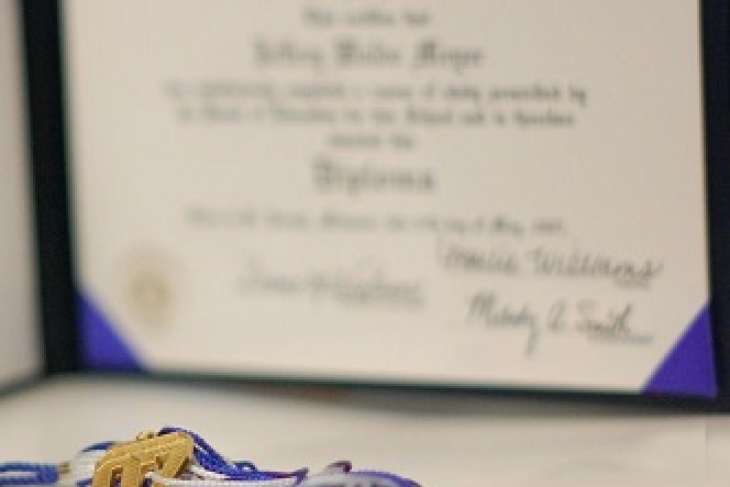In a recent EdNext column, Checker Finn proposed what he expected to be a controversial solution to the problem of low levels of college readiness among our high school graduates: namely, “different ways of completing—and being credentialed for completing—one’s primary and secondary education.”
In case Checker is holding his breath, I would like to raise a (quiet) howl of protest—just not for the reason Checker expected. The reality is that differentiated credentials are already here; they are common, diverse and wide-spread. New York State did retire the “Local Diploma” option a few years back for non-special-education students, requiring all students to earn at least a Regents diploma. I say “at least” because there are many different kinds of Regent diplomas (see here for detailed look at the array of designations and endorsements in NYS).
New York is not alone. A decade ago, Achieve reported that twenty states had multi-tiered diplomas, with designations such as “honors,” “advanced academic” and “advanced technical.” To earn a higher diploma, states may require students to earn additional course credits or complete more advanced courses, especially in mathematics, science, foreign languages and/or technical programs. Others may require students to pass more state assessments, pass state assessments at a higher performance level, or pass AP or IB exams. According to the experts at Achieve who continue to track graduation requirements, the level of complexity has only grown since 2004.
Beyond these K–12 policies, the University of California System established “A–G” requirements for high school graduates applying to their selective universities, and high schools in the state report on the percentage of students completing A–G requirements. Other states, such as Maryland, have established similar ways to differentiate among and report on high school graduates.
Whether driven from the K–12 or postsecondary side, whether based on courses or assessments, differentiated diplomas compose a varied—with wide-ranging differences across states, not to mention local variability within states—patchwork across the United States.
Whatever the requirements are for earning different credentials, however, the true value of a high school diploma is established by the colleges that admit and the employers who hire our high school graduates. Students must know and understand the connection between their level of readiness and the opportunities available to them after graduation. The challenge then, is not establishing differentiated high school diplomas. As I see it, the challenges lay elsewhere.
The first and perhaps less controversial challenge is truth in advertising. States must understand through analysis of K–12 and postsecondary data the relationship between high school preparation (including courses completed, course grades, and assessment performance) on the one hand and postsecondary success (including early success, credit accumulation, and degree completion) on the other. States ought to verify that a college-ready credential is indeed aligned with the preparation required for college success. States must be honest with students—and with the public—about what it takes to be ready, about whether our graduates are ready or not, and about the opportunities available—or not available—to graduates based on their level of readiness and the credentials that signify it.
The second challenge—and perhaps the controversial one worrying Checker—amounts to denying opportunities to those who fail to earn a “gold star [that] signal[s] college readiness.” Simply put, if you need remediation, you are not going to college. States such as Virginia and systems such as SUNY have already moved remediation out of the four-year institutions, but that may not go nearly far enough. Too many remedial students are enrolling in (mostly community) college, incurring debt and washing out. Remediation is not nearly the hand-up that some suggest, and it comes at a high price.
What would happen if students could only enroll in degree programs—and earn credit towards degrees—if they are determined to be “college ready” at the time of admissions? High school graduates requiring remediation could be treated the same way as adults returning for a computer science course at the local community college, but who have no intention of earning a degree. Sign up, take a course in system networking or welding or high school algebra and move on. Any student wishing to take credits towards a degree or certificate would need to apply, demonstrate readiness, and be admitted whether at a two- or four-year institution. Student who pass their remedial coursework can then apply to a degree program.
Going further still, what would happen if student loans were only available to students qualified to be admitted into a degree program, having demonstrated readiness? If students are going to incur debt to take college courses, they ought to have a reasonable chance to earn a degree and secure a good job sufficient to support themselves—including moving out of their parents’ basement—AND repay their student loans. Offering student loans to a high school graduate with a predictably high risk of failure in college is predatory.
The essence of the English system Checker mentions is the denial of college access for students unable or unwilling to demonstrate that they are college ready, and a clear understanding among students and their parents of what is required to advance. If you don’t make the cut, you don’t move up. Here in the U.S., the emphasis has been expanding access and opportunity without enough attention paid to the price of going to college unprepared for success.
I agree with Checker that it would be controversial if we were truly honest about what it means to be college ready, but the howls of protest would arise not because of differentiated high school diplomas. The howls will come if our education system established different ways of gaining access to—and securing loans to fund—one’s postsecondary education based on demonstrated college readiness.
John Kraman is the former research director for the American Diploma Project.
